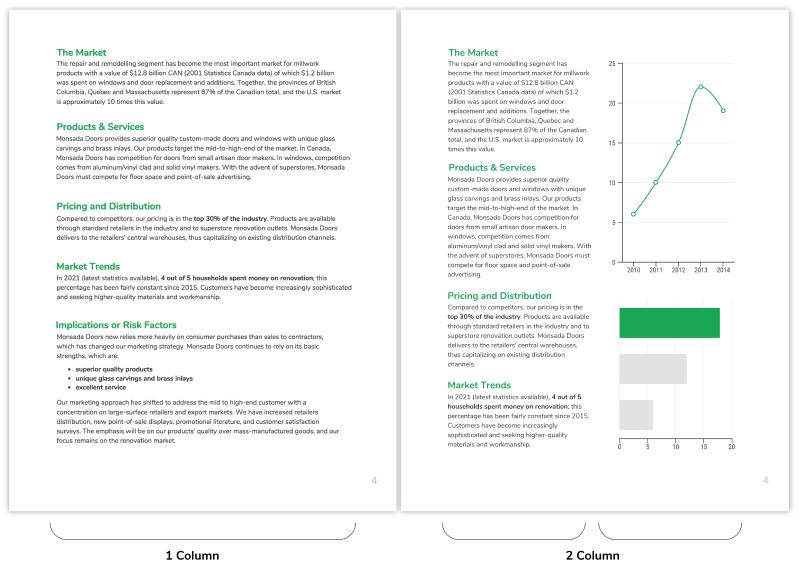How to create your business plan?
Creating a business plan is a crucial step for entrepreneurs and business owners to outline their business concept, strategy, and financial projections. Here are the essential components and steps to help you create an effective business plan:
Components of a Business Plan:
Executive Summary:
- Briefly summarize the key points of your business plan, including your business idea, mission, vision, and goals.
Business Description:
- Provide detailed information about your business, including its name, location, legal structure, and a brief history if applicable.
Market Analysis:
- Conduct a thorough analysis of your target market, industry trends, and competitors. Identify your target customers and explain how your business will meet their needs.
Organization and Management:
- Outline your business structure, key team members, and their roles. Highlight any relevant experience and expertise.
Product or Service Offering:
- Describe the products or services your business offers. Highlight their features, benefits, and any unique selling propositions.
Marketing and Sales Strategy:
- Detail your marketing and sales approach. Include information on pricing, promotion, distribution, and sales tactics.
Funding Request (if applicable):
- If you're seeking funding, clearly state the amount you're requesting and how you plan to use the funds. Provide financial projections and repayment plans.
Financial Projections:
- Include detailed financial forecasts, such as income statements, balance sheets, and cash flow statements. Project revenues, expenses, and profits over a specific period.
Appendix:
- Include additional documents and information that support your business plan, such as resumes of key team members, market research data, or other relevant materials.
Steps to Create Your Business Plan:
Research and Gather Information:
- Collect data on your industry, market, and competitors. Understand your target audience and their needs.
Define Your Business Concept:
- Clearly articulate your business idea, mission, and vision. Identify what sets your business apart from others.
Outline the Structure:
- Define your business structure (sole proprietorship, LLC, corporation, etc.) and organizational chart. Specify roles and responsibilities.
Market Analysis:
- Conduct a thorough analysis of your market, including demographics, trends, and competition. Identify opportunities and challenges.
Product/Service Development:
- Provide detailed information about your offerings. Explain how your products or services solve a problem or fulfill a need.
Marketing and Sales Plan:
- Develop a comprehensive plan for promoting and selling your products or services. Include pricing, distribution channels, and promotional strategies.
Financial Projections:
- Create detailed financial projections based on realistic assumptions. Include income statements, balance sheets, and cash flow statements.
Executive Summary:
- Write a concise executive summary that summarizes the key points of your business plan. This is often the first section read by potential investors.
Review and Revise:
- Review your business plan thoroughly. Seek feedback from mentors, advisors, or trusted colleagues. Revise and refine as needed.
Presentation (if applicable):
- If you plan to present your business plan to potential investors or lenders, create a visually appealing presentation that highlights key points.
Remember that a business plan is a dynamic document that should be updated regularly as your business evolves. It serves as a roadmap for your business and can be a valuable tool for decision-making and securing funding.
Crafting Your Blueprint: A Step-by-Step Guide to Business Plan Creation
A strong business plan is the roadmap to your entrepreneurial journey. It's not just a formality; it's a vital tool for attracting investors, securing funding, and guiding your company's growth. Here's a step-by-step guide to crafting a winning business plan:
1. Define Your Vision and Mission:
- Start with the "why": What problem are you solving? What value will you bring to the market?
- Craft a concise mission statement: This should encapsulate your core purpose and values.
- Define your vision: Envision your company's ultimate aspirations and long-term goals.
2. Conduct Market Research:
- Analyze your target audience: Who are your ideal customers? What are their needs, wants, and pain points?
- Competitor analysis: Research your competition, identify their strengths and weaknesses, and find your unique selling proposition (USP).
- Industry trends: Understand the current landscape and future projections of your chosen industry.
3. Develop Your Business Model:
- Outline your value proposition: How will you deliver value to your customers and differentiate yourself?
- Define your revenue streams: How will you generate income? Identify various avenues.
- Pinpoint your operational costs: Analyze your fixed and variable expenses for effective budgeting.
4. Craft Your Marketing and Sales Strategy:
- Identify your marketing channels: How will you reach your target audience? Explore digital platforms, offline strategies, and partnerships.
- Develop your sales funnel: Define the steps customers take from awareness to conversion.
- Outline your pricing strategy: Determine competitive and sustainable pricing for your products or services.
5. Build Your Financial Projections:
- Create financial statements: Develop pro forma income statements, balance sheets, and cash flow statements to forecast your financials for the next few years.
- Identify funding needs: Estimate your startup costs and ongoing expenses to determine how much funding you require.
- Break-even analysis: Calculate the point where your revenue covers your costs, helping you understand your financial viability.
6. Assemble Your Team:
- Highlight key personnel: Introduce your founders, management team, and any advisors with relevant expertise.
- Showcase their skills and experience: Emphasize how their backgrounds align with your business goals.
7. Write in a Clear and Concise Style:
- Structure your plan logically: Use headings, subheadings, and bullet points for easy navigation.
- Maintain a professional tone: Avoid jargon and use clear, concise language.
- Keep it concise: Aim for a 15-20 page document, focusing on the most critical information.
8. Seek Feedback and Refine:
- Share your plan with trusted advisors, mentors, or potential investors for constructive feedback.
- Be open to revisions and iterate on your plan based on the feedback received.
- Remember, your business plan is a living document; update it regularly to reflect your progress and changing circumstances.
Additional Tips:
- Focus on storytelling: Bring your vision to life and capture the reader's interest.
- Use visuals: Incorporate charts, graphs, and images to enhance your presentation.
- Be realistic and data-driven: Back up your claims with market research and credible sources.
- Stay passionate and optimistic: Conveying your enthusiasm for your business is contagious.
By following these steps and incorporating your unique vision, you can develop a compelling business plan that sets you on the path to success. Remember, there's no one-size-fits-all approach, so adapt these guidelines to your specific business and industry.
With a well-crafted blueprint in hand, you're ready to navigate the exciting journey of building your entrepreneurial dream!













